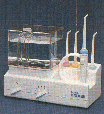The main cause of periodontal disease and tooth decay is bacterial
plaque. Plaque forms continuously on your teeth and is a sticky colorless film. It can be
made more visible with the use of "disclosant" dyes. By removing plaque daily,
you can prevent the damage associated with periodontal disease.
Daily plaque control is very important! Periodontal disease is the
major cause of adult tooth loss. It affects three out of every four adults. Replacing lost
teeth is the most expensive form of dental treatment. By making an investment of time into
your daily plaque removal, you may be able to avoid thousands of dollars of replacement
dentistry. Usually only ten to fifteen minutes a day are required to fully cleanse your
mouth of these harmful bacteria.
Brushing- In general, a soft bristle brush is the most beneficial.
Hard and medium texture tooth brushes
can abrade the gum and cause recession. Additionally, soft bristles can flex into hard to
reach areas. If the bristles of any toothbrush are worn, bent or frayed, replace the
brush. A worn out brush will not clean the teeth properly. To clean the outside surfaces,
hold the brush at a 45-degree angle(lower left) to the tooth where the gums meet the
tooth. Using small circular strokes or small back and forth strokes, gently move the brush
back and forth using light pressure. When you have completed the sides of all teeth,
remember to brush the biting surfaces (lower right). If the gums are inflammed some
bleeding may result, but usually stops after 2 weeks of brushing and flossing. After
cleaning the outside, use the same technique on the inside. In areas where the brush does
not have enough space to lay horizontally, such as the lower front teeth, hold the brush
vertically. Finally, clean the biting surface of all teeth.



Toothpastes vary
widely in their ingredients and their effectiveness. If you look at the selection in any
dental section, you will soon be very confused. The most basic concept to remember is that
there are specific pastes for specific goals. There are whiteners, tartar controls, cavity
fighting, breath freshening; A listing is available by E mail of which ones our
patients are advised.
Flossing- The most vulnerable area of the gum to periodontal disease
resides between the teeth. Even the best brush designs cannot cleans this area. There are
many different types of dental floss. Flossing
is the most effective way to reach these areas. Technically, flossing may be difficult to
master, but repetition will soon make flossing a secondary habit which can be done
effortlessly. Begin with a piece of floss that is 18 inches long. Lightly wrap most of the
floss around the middle fingers of each hand, then grasp a length of about one inch
between your thumb and index fingers. Gently insert the floss between the teeth. A slight
"sawing" motion may be necessary to pass the floss between the tight contacts.
Curve the floss into a tight "C" shape pulling it against one tooth until you
feel tight resistance. Move the floss up and down against the side of the tooth, extending
two to thee millimeters below the gum. As the floss becomes frayed or soiled, a turn from
one middle finger to the other will bring up a fresh section. Do this every day.
/ /
/ 
Interdental brushes-Occasionally you will be instructed to use a
small, conical shaped brush for additional cleaning between your teeth. These are
particularly advantageous when there are larger spaces between your teeth. These should
also be used once a day.
Rinsing- Rinse vigorously for as long as the manufacturer advises to
dislodge plaque and food particles that have been loosened by the brushing and flossing.
There are several brands of rinses,
however only a few are beneficial. A list of the most effective rinses will be made
available upon Email request
Irrigators- Oral irrigation devices are particularly helpful in
removing food particles after meals, especially from around bridgework and other hard to
clean areas. Additional clinical benefits can be accomplished with irrigation devices if a
diluted, commercially available rinse is used instead of plain water. Irrigation systems .

Tongue Scrapers- The top surface of the tongue is a haven for
plaque! Brushing the tongue is helpful, but using tongue scrapers is far more effective. Do this every night!
You'll be surprised how much plaque you remove and how this contributes to breath
freshness!